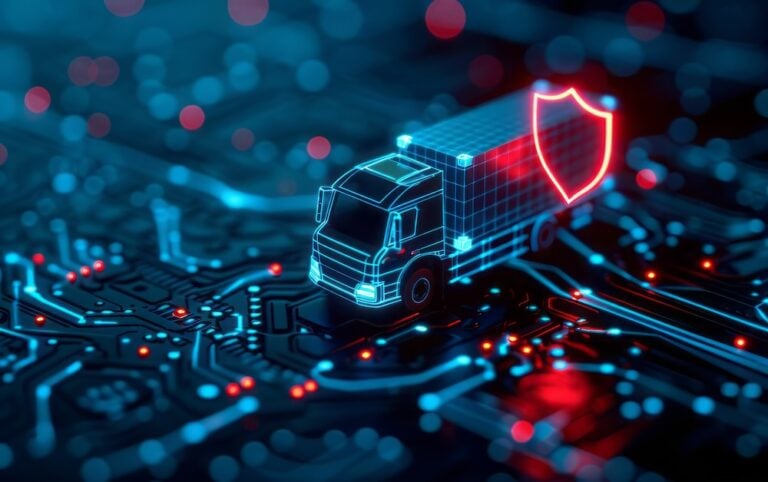Cyberattacks on supply chains can have devastating consequences, ranging from operational disruptions and financial losses to reputational damage and legal repercussions. The logistics industry is particularly vulnerable to cyber threats due to the large number of actors involved, the constant exchange of data, and the reliance on information systems. According to an IBM study from 2023, one in five companies in the logistics and transportation sector is expected to experience a cyber incident. A comprehensive cybersecurity approach is therefore essential to ensure the security and continuity of supply chains.
Risks and Threats in the Digital Supply Chain
Ransomware Attacks
Cybercriminals use ransomware to encrypt IT systems and then demand a ransom. This often occurs through emails containing infected files or links, as well as through compromised online advertising. Such attacks can paralyze the operations of shipping and logistics companies, leading to significant financial losses.
Data Loss and Theft
Supply chains rely heavily on the seamless transmission and processing of sensitive data, including customer information, financial data, and logistics plans. Cyberattacks aimed at data loss and theft pose a serious threat. By compromising such data, attackers can engage in identity theft, fraud, and industrial espionage. The consequences range from financial losses to legal liabilities and substantial reputational damage for affected companies.
IoT Device Manipulation
The Internet of Things (IoT) is gaining increasing importance in logistics, whether in the form of smart warehouse management systems or connected vehicles. Despite their advantages, IoT devices are often inadequately secured, making them attractive targets for cybercriminals. By hacking these devices, attackers can severely disrupt operations, take control of critical infrastructure, or access sensitive data. Such manipulations can lead to operational interruptions as well as significant financial and security-related consequences.
Denial-of-Service Attacks (DDoS)
A Denial-of-Service (DDoS) attack aims to disrupt the functionality of a website by overwhelming servers and networks with a flood of traffic. This results in the website becoming inaccessible to legitimate users. Such attacks are often carried out through a network of hacked and remotely controlled devices or computers, generating massive amounts of traffic that can crash the target’s infrastructure.
Supply Chain Attacks
Cybercriminals often exploit vulnerabilities in the supply chain to gain access to the systems of larger companies. These attacks typically target less secure partners or suppliers in order to infiltrate the systems of larger organizations. Such attacks can be difficult to detect and often cause significant damage before they are even discovered. The complexity and the numerous actors involved in modern supply chains make them an attractive target for this type of attack.
Measures to Improve Cybersecurity
An optimal cybersecurity management approach requires a holistic strategy that includes both technical solutions and organizational measures. Here are some key strategies that modern supply chain managers should implement:
Security Awareness and Training
Employee security awareness is crucial, as they are often the weakest link in the security chain. Regular training and awareness programs are therefore essential. These programs should focus not only on identifying phishing emails and suspicious links but also on promoting secure behaviors when handling sensitive information and IT resources. A well-trained team is better equipped to recognize potential threats and respond appropriately, ultimately strengthening the company’s security posture.
Strong Access Controls
Strict access controls are vital to any cybersecurity strategy. Implementing multi-factor authentication ensures that only authorized individuals can access critical systems and data. This additional security measure significantly reduces the risk of unauthorized access and provides a robust defense against potential cyberattacks.
Encryption and Secure Communication
The security of sensitive data requires the use of encryption technologies during both transmission and storage. By implementing secure communication protocols such as HTTPS and VPNs, companies can ensure that data is protected from unauthorized access and manipulation. These strategic measures are crucial to securing sensitive information, whether it is transmitted over the internet or stored internally. Additionally, securing IoT devices is essential to maintain the integrity and security of logistical processes.
Regular Security Audits and Penetration Testing
Regular audits and testing help identify and address potential vulnerabilities in IT systems before cybercriminals can exploit them. These tests simulate real cyberattacks to assess the effectiveness of existing security measures and reveal security gaps that attackers might exploit.
Security Policies and Compliance
Clear security policies must be strictly adhered to by all employees and partners to ensure compliance with legal and industry-specific security standards. These policies include best practices for handling data and IT resources securely, as well as ensuring that legal and industry-specific security standards are met. Companies must not only secure their own systems but also ensure that all partners and suppliers implement adequate security measures to mitigate such risks.
Collaboration and Information Sharing
Cybersecurity is a collective responsibility that goes beyond individual companies. Collaboration and information sharing between various actors in the supply chain are essential to developing and implementing a holistic security strategy. Important measures include:
Partnerships, Alliances, and Knowledge Transfer
Through active partnerships with cybersecurity experts and providers, logistics companies gain access to advanced technologies and expertise. These collaborations continuously strengthen their security infrastructures and effectively protect them from increasingly complex cyber threats. Additionally, industry alliances play a crucial role by fostering the exchange of information and developing common security standards that secure the entire supply chain industry.
Emergency Plans and Incident Response
A well-thought-out emergency plan (and, ideally, a specialized incident response team) is essential to responding quickly and effectively in the event of a cyberattack. Emergency plans contain clear responsibilities, escalation paths, and communication strategies to ensure that responses to security incidents are coordinated. Regular simulations and training help increase the team’s readiness and ensure that all participants are well-prepared when it matters most.
Technological Innovations and Future Perspectives
Technological advancements play a key role in improving IT security in supply chains. Some of the most promising innovations include:
Artificial Intelligence and Machine Learning
AI and ML help detect anomalies and suspicious activities in real time and initiate automated responses. These technologies offer a proactive defense that continuously learns and adapts to new threats. However, implementing AI-powered solutions requires careful integration and regular updates to ensure the systems work optimally and reliably.
Blockchain Technology
Blockchain offers a decentralized and tamper-resistant method for tracking and securing transactions within the supply chain. Through the transparency and immutability of data, blockchain helps ensure the integrity and trustworthiness of supply chain processes while minimizing potential vulnerabilities.
Quantum Encryption
Although still in its early stages, quantum encryption has the potential to provide nearly unbreakable security for data transmission. This revolutionary technology could play a key role in the future of data security in supply chains by offering extremely strong encryption that can withstand even the most powerful attacks.
Conclusion
Cybersecurity is a critical factor in modern supply chain management, which is increasingly shaped by digitization and data dependence. While increased connectivity brings efficiency gains, it also heightens the risk of cyberattacks that can cause operational disruptions, financial losses, and reputational damage. A comprehensive IT security strategy, which includes technological defense measures such as artificial intelligence and blockchain as well as organizational measures such as training and partnerships, is essential. Only through continuous adaptation and collaboration can companies ensure the security of their supply chains while fully leveraging the potential of digitization.









